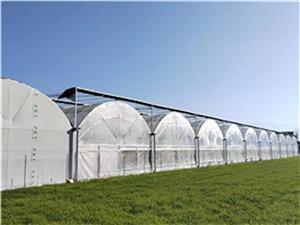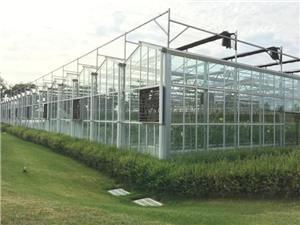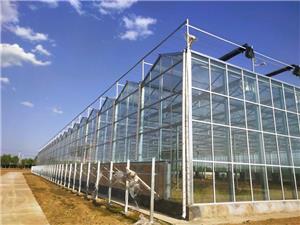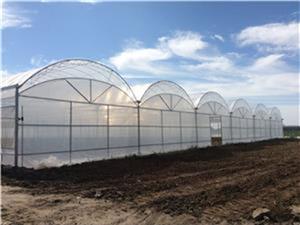China greenhouse charateristic
Design and Structure
Shape and Frame Materials
High-quality Chinese tunnel film greenhouses are usually designed in an arched or Quonset shape, featuring a sturdy structure capable of withstanding various weather conditions. The frame materials are typically made of galvanized steel, which is durable and corrosion-resistant.
Ventilation system
To maintain the optimal climate inside the greenhouse, an effective ventilation system is adopted. These systems can include rolling up the side walls, roof vents and automatic louvers, thus enabling precise control over temperature and humidity levels.
Covering material and thickness
The covering material is usually high-quality polyethylene film, which is a key component. These films are available in various thicknesses, and thicker films can offer better insulation and durability. The choice of film thickness depends on the local climate and the specific needs of the crops.
Climate control
Temperature regulation
One of the main advantages of tunnel film greenhouses is their ability to regulate temperature. The covering material allows sunlight to enter, warming the interior during the day. At night, the insulating properties of the film help retain heat and prevent a sharp drop in temperature.
Humidity control
Maintaining an appropriate humidity level is crucial for the health of crops. Tunnel film greenhouses can incorporate fogging systems, evaporative cooling, and natural ventilation options to effectively control humidity.
Natural light diffusion
The high-quality polyethylene film used in these greenhouses diffuses sunlight, ensuring that plants receive uniform light distribution. This minimizes shadows and provides a more even growing environment.
Irrigation and water resource management
Water-saving technologies
Modern tunnel film greenhouses usually adopt water-saving technologies, such as drip irrigation systems, which can deliver water directly to the roots of plants. This reduces water waste and promotes the effective absorption of nutrients.
drainage system
Proper drainage is crucial for preventing waterlogging and root rot. High-quality greenhouse designs feature effective drainage systems to ensure that excess water is removed from the crops.
Irrigation automation
Many tunnel film greenhouses are equipped with automatic irrigation systems, which can precisely control the watering schedule and ensure that plants receive the appropriate amount of water.
Cutting support and layout
Shelf and hanging system
To maximize space and crop density, these greenhouses are usually equipped with shelves and hanging systems, offering multi-level planting options. This is particularly useful for climbing plants and smaller crops.
Layout flexibility
The design of tunnel film greenhouses allows for flexible layouts and can be customized to meet the specific needs of different crops. This adaptability ensures efficient use of space.
Make the most of the space for crops.
The vertical and horizontal spaces in high-quality Chinese tunnel film greenhouses have been optimized to accommodate more plants. The increase in crop density helps to boost yields.
Advantages of high-quality Chinese tunnel film greenhouses
Increase crop yields
Extend the growing season
One of the most significant advantages of tunnel film greenhouses is the ability to extend the growing season. By providing a controlled environment, these structures enable farmers to grow crops throughout the year, unaffected by external weather conditions.
Optimized growth conditions
High-quality tunnel film greenhouses can precisely control environmental factors. They can adjust temperature, humidity and light levels to create ideal growing conditions for a variety of crops.
Prevent against bad weather
Crops grown in open fields are vulnerable to extreme weather events. Tunnel film greenhouses offer a protective shield against hail, heavy rain, strong winds and other weather-related risks.
Improve crop quality
Strengthen control over environmental factors
The ability to fine-tune the growing environment can enhance the quality of crops. This includes the consistency of size, color and taste of fruits and vegetables.
Reduce the pressure of pests and diseases
The controlled environment of tunnel film greenhouses minimizes exposure to pests and diseases, reducing the need for chemical pesticides and treatments.
Consistent crop quality
Consumers are increasingly demanding consistency in product quality. Tunnel film greenhouses ensure that crops meet specific quality standards throughout the year.
Resource efficiency
Reducing the use of water and fertilizers
Water-saving technologies and precise irrigation systems help conserve water and reduce the use of fertilizers. This is not only beneficial to the environment but also lowers operational costs.
Energy-saving design
The design of tunnel film greenhouses improves energy efficiency. The ability to retain heat reduces heating costs in cold months.
Sustainability and environmental benefits
By minimizing resource waste and reducing the carbon footprint associated with long-distance transportation, tunnel film greenhouses contribute to the sustainable development of agriculture.
Cost-effectiveness
Long-lasting and low maintenance costs
High-quality Chinese tunnel film greenhouses are durable, made of durable materials and with a solid structure. In the long run, they have low maintenance requirements and are cost-effective.
The potential to achieve higher investment returns
The combination of increased crop yields, improved crop quality and enhanced resource efficiency usually brings higher profits to farmers and may offer excellent returns on investment.
Flexibility and adaptability
Suitable for various types of crops
Tunnel film greenhouses have a wide range of uses and can be used to grow a variety of crops, from vegetables and flowers to berries and herbs.
Scalability for Different Farm Sizes
These greenhouses can adapt to small family farms or large commercial operations, providing scalability to meet diverse agricultural needs.
Customized options for specific agricultural needs
Farmers can choose to customize tunnel film greenhouses to meet their specific needs, whether for organic farming, specialty crops, or research purposes.
Challenges and Considerations
Although tunnel film greenhouses have many advantages, it is important to consider potential challenges and factors:
Potential drawbacks or limitations
The initial investment cost may be a barrier for small-scale farmers.
Appropriate management and training are crucial for maximizing benefits.
Regular maintenance and repair are necessary to ensure a long service life.
Maintenance and Precautions
Regularly check if the covering material is worn out.
Maintenance of ventilation and climate control systems.
Management of pests and diseases in greenhouses.
Initial investment and financing plan
Governments and organizations often provide financial assistance or subsidies to promote the adoption of greenhouse gases.
For those who wish to invest in high-quality tunnel film greenhouses, they can choose private financing options.




